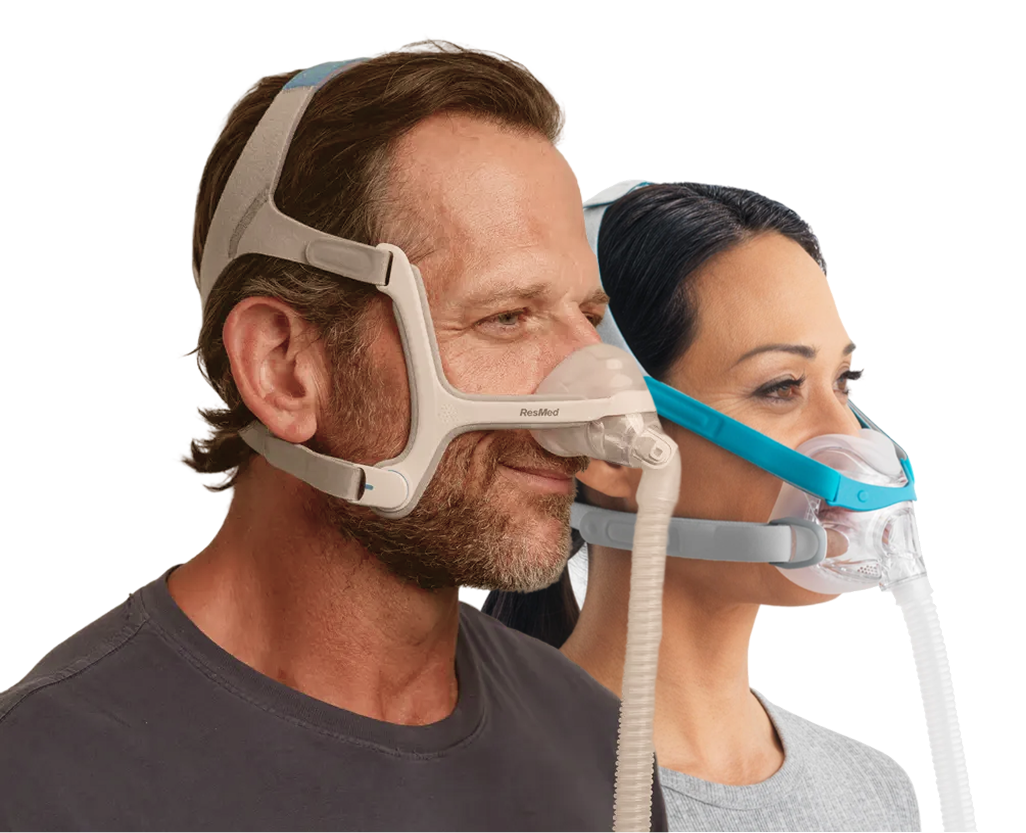Sleep disturbances caused by interrupted breathing are hallmarks of sleep apnea, which affects numerous individuals worldwide. Amongst available treatments is CPAP therapy. It offers respite from such disruptions by providing continuous positive airway pressure during slumber hours. However sleeping with a CPAP machine can be cumbersome for some people leading to unresolved symptoms and other health problems. This article endeavors to evaluate the long-term side effects of cpap machine while offering viable alternatives fоr those impacted by this debilitating condition.
Overview of CPAP meaning
A CPAP machine is one of the most common treatments for sleep apnea. It keeps your airways open while you sleep.
What is the CPAP?
CPAP (Continuous Positive Airway Pressure) is a device that uses gentle air pressure to keep your airways open while you sleep. Your doctor may prescribe CPAP to treat sleep-related breathing disorders, including sleep apnea. CPAP can also be used to treat premature babies with underdeveloped lungs.
How does a CPAP machine work?
Continuous positive airway pressure (CPAP) is a treatment method for sleep apnea. During sleep, the CPAP delivers pressurized air with enough pressure to prevent your airway from collapsing. The pressurized air is delivered through a mask that covers your mouth or nose. This allows you to breathe effortlessly and sleep without waking up. The CPAP machine does not breathe for you.
CPAP machine side effects dangers
+ Body changes after CPAP
Persistent sleep apnea symptoms: If you are unable to fall asleep with CPAP, your sleep apnea may go untreated, resulting in persistent symptoms such as loud snoring, gasping during sleep and daytime sleepiness. Untreated sleep apnea can seriously affect your quality of life.
Poor sleep best: difficulty napping with a CPAP can lead to restless nights and fragmented sleep, preventing you from achieving the restorative sleep necessary for best cognitive function, emotional nicely-being, and physical fitness. Explore the relationship between CPAP and good sleep for a deeper understanding of the matter.
Daytime drowsiness and fatigue: Inadequate sleep due to CPAP intolerance can cause Excessive Daytime Sleepiness, affecting your productivity, focus, and mood during the day.
+ Side effects of long term cpap use
CPAP side effects lungs: One of the CPAP machines side effects that people sometimes report is lung pain, chest pain, or a funny feeling in the lungs upon awakening.5 However, this pain does not come from the lungs and does not indicate that the lungs are injured or damaged by the machine. Rather, it is a pain that occurs when the chest muscles adapt to exhale against pressure.
CPAP side effects weight gain: Some of these and other studies reported a significant increase in IGF-1 in PPC-dependent patients. Restoration of the GH axis and increased IGF-1 in PPC-dependent patients therefore probably contributed to weight gain and a potential increase in LBM.
CPAP side effects heart: Although CPAP machines are not known to cause heart problems, a malfunctioning CPAP machine can contribute to these problems by exposing you to carcinogenic particles and toxic chemicals. CPAP machines can reduce the likelihood of heart failure in sleep apnea patients, especially if they are over 60.

8 Common CPAP side effects when using CPAP machines
Using a CPAP machine for sleep apnoea can lead to various side effects, including long-term complications. Below are some commonly reported issues:
Dry Mouth
Individuals who sleep with their mouths open may experience worsened dry mouth when using CPAP machines that cover only the nose. Even full-face masks can contribute to dryness
Dry Eyes
An ill-fitting mask may cause air leaks, particularly when changing positions during sleep. This can direct airflow into the eyes, leading to dryness and irritation upon waking.
Additionally, improper mask hygiene can allow bacteria to accumulate. If air leaks or bacteria travel through tear ducts, this may result in eye infections.
Headaches
Excessively tight masks or Side effects of CPAP pressure too high can cause headaches. Continuous pressure on the nasal passages may lead to inflammation and sinus congestion, further exacerbating headaches.
Shortness of Breath
While CPAP therapy is designed to improve airflow, some users may initially feel breathless, particularly if they are unaccustomed to the mask or air pressure.
Claustrophobia
Many users experience claustrophobia due to the tight fit of the mask, which may create a sensation of suffocation.
Aerophagia (Swallowing Air)
Excessive air pressure may force air into the digestive system, leading to bloating, gas, abdominal discomfort, and pain.
Nasal Congestion
Dry, pressurised air can cause nasal congestion, irritation, or even nosebleeds, particularly in individuals prone to sinus infections. Furthermore, dust or mold buildup in the mask and tubing can trigger allergic reactions.
Skin irritation
These typically result from a mask that fits too tightly and repeatedly rubs against the same area of the face.
How to Prevent CPAP Machine Side Effects
| Adjust or replace your CPAP Mask |
- Proper CPAP masks fitting, regular cleaning - Adjust the straps for a snug but comfortable seal. Try different mask sizes or styles if leaks persist. - Ensure the mask fits snugly but not too tight to avoid pressure on the nasal passages. |
| Try the CPAP Accessories |
- Use a Chin Strap to keep your mouth closed while using CPAP machine for sleeping to prevent air leakage. - Attach a humidifier to your CPAP machine to maintain moisture in your airways and reduce dry mouth. |
| Keep your CPAP devices clean |
- Clean the mask daily with mild soap and replace worn-out parts regularly to prevent bacteria buildup - Regular cleaning of the CPAP components is essential. Consulting a healthcare provider can help address any persistent discomfort. |
| Sleep position and lifestyle changes |
- Sleep on your side - Behavioral techniques, including rest sporting events, will let you manage anxiety or claustrophobia. |
In case you can not tolerate CPAP machines, discuss opportunity remedies together with your healthcare provider. Options may additionally consist of BiPAP (Bilevel fantastic Airway pressure) therapy, which offers variable pressure levels for inhalation and exhalation, or an oral equipment that repositions the jaw to hold an open airway throughout sleep. On the other hand, surgery may be considered to cope with the underlying reason for sleep apnea.
Treatment Options for Sleep Apnea Without CPAP
For those seeking sleep apnea treatment without CPAP, various alternative therapies are available. Each option addresses different aspects of the condition, allowing for more personalized and effective solutions based on individual needs and preferences.
Lifestyle Changes
-
Weight Loss: Excess weight, especially around the neck, can narrow the airway and increase the risk of collapse during sleep. Shedding extra pounds may significantly improve obstructive sleep apnea, particularly in mild to moderate cases.
-
Exercise: Regular physical activity, especially exercises that strengthen upper airway muscles, can help reduce symptoms.
-
Positional Therapy: Sleeping on your side instead of your back can lessen symptoms. Using pillows or specialized devices can help maintain this position.
-
Avoiding Alcohol and Sedatives: These substances relax throat muscles, making airway obstruction more likely. Limiting their use can improve airway stability during sleep.
Oral Appliances
Oral appliances offer an effective alternative to CPAP therapy for managing sleep apnea. These devices help keep the airway open by adjusting the position of the jaw and tongue.
-
Mandibular Advancement Devices (MADs): Custom-fitted by dentists, these devices hold the lower jaw forward to prevent airway collapse. They are particularly effective for mild to moderate obstructive sleep apnea (OSA).
-
Tongue Retaining Devices: Designed to keep the tongue in place, these appliances prevent it from blocking the airway during sleep.
-
Bite Guards (Splints): Useful for individuals who grind their teeth (bruxism), bite guards help maintain an open airway while protecting teeth from damage.
Surgery
For severe sleep apnea or cases where other treatments fail, surgery may be a suitable option. These procedures aim to reduce airway obstruction by modifying throat or upper airway structures.
-
Uvulopalatopharyngoplasty (UPPP): Removes excess throat tissue to widen the airway.
-
Genioglossus Advancement (GA): Moves the tongue muscle forward to prevent blockage.
-
Maxillomandibular Advancement (MMA): Adjusts the upper and lower jaw to improve airflow.
-
Nasal Surgery: Corrects structural issues, such as a deviated septum, that hinder breathing.
Recovery time and success rates vary, so consulting a healthcare professional is essential to determine the most suitable approach.
Nasal Breathing Aids
Enhancing nasal airflow can help reduce sleep apnea severity, especially for those with mild cases or nasal congestion. Common nasal breathing aids include:
-
Nasal Strips: Adhesive strips that widen the nostrils to improve airflow.
-
Nasal Dilators: Devices inserted into the nostrils to prevent collapse, benefiting those with restricted nasal passages.
-
Saline Rinses and Nasal Sprays: Help clear congestion and allergies, promoting unobstructed breathing during sleep.
Sleep Hygiene
Enhancing sleep habits can help ease mild sleep apnea symptoms and improve overall sleep quality. Key practices include:
-
Maintaining a Consistent Sleep Schedule
-
Establishing a Relaxing Bedtime Routine
-
Optimizing the Sleep Environment
Alternative Therapies
Complementary therapies focusing on overall wellness and respiratory health may offer additional support for sleep apnea. While further research is needed, some individuals find relief through:
-
Acupuncture: Sleep study suggests it may improve muscle tone and airway function, reducing apnea events.
-
Yoga: Enhances breath control and relaxation, helping to lower stress and support respiratory health.
-
Breathing Exercises: Techniques like Buteyko breathing may strengthen respiratory muscles and potentially lessen apnea severity over time.
If you have sleep apnea, your healthcare provider may recommend a continuous positive airway pressure cpap machine as the first treatment option. While using a machine for sleep may feel inconvenient, quality rest is essential for your health. If your CPAP is uncomfortable, speak with CPAP Discount Warehouse about different mask and machine options. With some adjustments, you can find a solution that ensures restful sleep.






